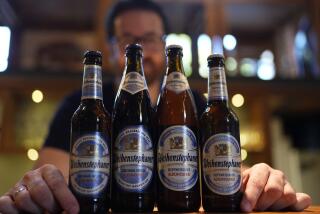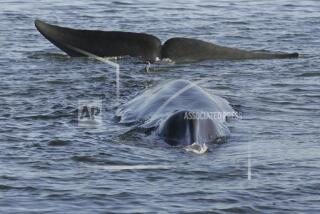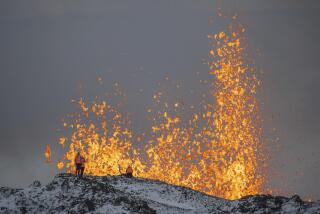It’s Beer Day in Iceland--After 74 Years
- Share via
REYKJAVIK, Iceland — Jubilant Icelanders quaffed legal local lager for the first time in 74 years Wednesday when prohibition laws banning the sale of full-strength beer officially ended.
Lines formed outside some of the 17 state liquor stores that hold the monopoly on selling take-home spirits. When the doors swung open at the Snorra Braut branch in central Reykjavik, there were cheers and applause.
Two new pubs timed their opening day to coincide with “B-Day,” and many restaurants and bars reported that their tables were booked up weeks in advance by Icelanders planning to celebrate their new freedom.
In one new pub in Reykjavik, The Beer Cellar, a bell was rung at noon and customers were asked to observe a moment of silence before taking a gulp.
Alcoholic drinks became illegal in Iceland in 1915 after a referendum, and although prohibition was repealed in 1933, beer containing more than 2.25% alcohol remained outlawed.
The weak beer never gained popularity, and Icelanders who wanted to imbibe legally often resorted to the national drink called the Black Death, a mind-numbing, clear liquid that is 40% alcohol and tastes like vodka.
Parliament finally passed a law legalizing beer in May and gave the island nation of 251,000 until March 1 to prepare for the change.
After the moment of silence at The Beer Cellar, Magnus Sveinsson, president of the Reykjavik City Council, cut a ribbon and enjoyed the first glass of locally brewed suds. Each customer got a free glass of beer--no little thing, considering that bars are charging $3.90 to $4.80 a glass.
“This is indeed a world event,” Sveinsson joked to the cameras, adding: “I am convinced Icelanders will learn to handle beer, seeing as Icelanders have always been open to foreign cultural influences.”
He urged people to take buses home, citing lines from “I Think I’ll Walk Home,” a song by pop star Valgeir Gudjonsson against drunken driving.
The song, commissioned by the state Board of Alcoholism Prevention, was been played incessantly on radio and TV before “B-Day.”
Newspapers have carried ads warning that “Beer Is Alcohol,” just in case any Icelanders have forgotten after 74 years.
In Parliament a few days ago, Education Minister Svavar Gestsson accused the media of hyping the occasion. He said all efforts to educate the public about the evils of drink “have proved in vain against this terrible flood.”
Police said they are on heightened alert for drunken drivers.
Iceland prides itself on having relatively low alcohol consumption, but intake has jumped from an annual 6.7 pints per person in 1981 to 9.45 pints now.
The state, which controls the liquor supply, is exacting hefty levies on beer. A 24-can case of imported beer costs about $57.60.
The price was expected to be even higher, but the government decided it should not outprice hard liquor. Before legalization, smuggled beer fetched about $70 for a 24-can case.
Beer over 5.6% alcoholic content remains banned, and pleading lack of storage space, the government has also restricted the number of imported brands to three--Budweiser from the United States, Tuborg from Denmark and Kaiser from Austria. Two local breweries are providing four other brands.
More to Read
Sign up for Essential California
The most important California stories and recommendations in your inbox every morning.
You may occasionally receive promotional content from the Los Angeles Times.













